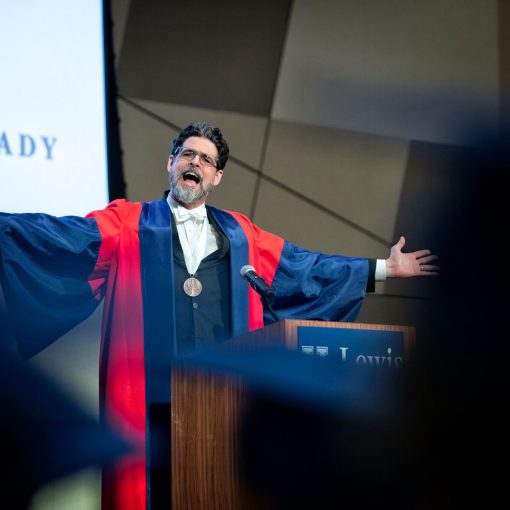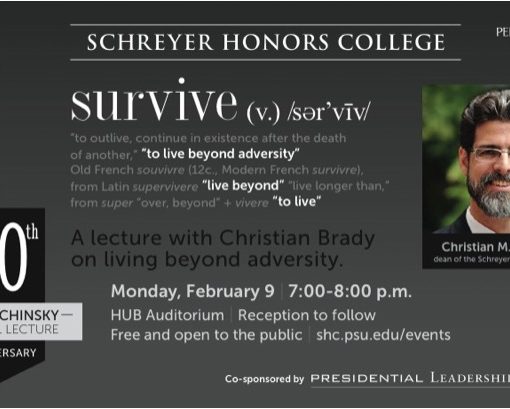HERU 2013 – Keynote Address
Welcome to the inaugural Honors Education at Research University conference! It is a great pleasure to have you all here at Penn State. Gathered are nearly 100 representatives of 28 schools from around the nation and the world, including our colleagues from the Netherlands and the universities of Radboud and Utrecht.
I would be remiss if I did not begin our event by thanking those who have made this possible. While the idea of such a meeting arose within the annual meeting of the so-called CIC schools (the Big 10 plus Chicago), the planning committee included representatives of other schools as well. Would those on the committee please stand as I call your names?
Dr. Cynthia Jackson-Elmoore, Dean, Honors College, Michigan State University
Dr. Anne Krabacher, Senior Associate Director, University Honors and Scholars Center, Ohio State University
Dr. Nancy West, Director, Honors College, University of Missouri
Dr. Bette Bottoms, Vice Provost for Undergraduate Affairs and Dean of the Honors College, University of Illinois of Chicago
Dr. Matthew Auer, Dean, Hutton Honors College, Indiana University
Dr. Arun Upneja, Associate Dean for Academics, Schreyer Honors College, Penn State
Dr. Michele “Mitch” Kirsch, Associate Dean for Student Affairs, Schreyer Honors College, Penn State
Tom Weber, Director of Information Technology, Schreyer Honors College, Penn State
Chris Arbutina, Coordinator of College Relations, Schreyer Honors College, Penn State
Lisa Mellott, Assistant to the Dean, Schreyer Honors College, Penn State
Thank you all for helping put this conference together.
Whether this is the first of many HERU conferences is up to the community. We will have a reaction survey put up on the website, http://honorseducation.com, to gather feedback and suggestions, including space for you to indicate your desire to organize or participate in a future conference.
I believe I speak for the committee when I say that it was not our vision to create a new NCHC or even a new annual conference. Rather simply to provide an occasional venue for sharing best practices and support for one another. If another school or group of schools would like to join to host another HERU conference, I think that would be great! But this planning committee’s sense was that it is best if it develops organically rather than through the creation of yet another formal organization.
Unique, just like everyone else.
The reasons for such a meeting are fairly well known to us all. Honors societies and disciplinary programs have existed for decades, but it was within large public universities that honors programs and colleges primarily developed over the last 50-plus years. In recent years, however, honors programs have begun to flourish in smaller settings, including community colleges.
I often tell prospective students who are considering their various options that they must remember that each honors college or program is unique to their setting. We all reflect the institution of which we are inseparably a part. We each thus face our own unique challenges and difficulties relating to specific cultures, mission, climate, budgetary models, and so on. Yet we whose programs are within major research universities also share much in common with one another. We have opportunities and challenges that are quite different from those that present themselves to honors programs in community colleges and smaller institutions.
Furthermore, I believe that our ability to answer (or not) the challenges before our honors programs will be predictors of the future of our host institutions. A healthy and active honors college or program is the bellwether of a vibrant university.
It’s the economy…
The most obvious and immediate challenge to public higher education is budgetary constraints. All of us, even and especially our Dutch colleagues, are from institutions that receive significant state funding and support. Even those of us whose institutions are merely “state affiliated” take our identity in no small part from our status as universities that serve the public. Yet in the past few years we have seen the dramatic decline in public funding and in the next decade I believe we will see that the landscape of public higher education in the United States will have changed dramatically.
With these changes come new challenges and some of those challenges even offer us, to use the administrative euphemism, opportunities.
Budgetary pressures cause the reevaluation of all programs, especially those that offer distinct privileges and advantages for a few students. Bette Bottoms from the University of Illinois of Chicago told me that at the most recent the American Association of Colleges and Universities, a senior fellow issued “the call for reallocating resources that are given to the most capable students in Honors programs to the most at risk students, as all universities struggle to increase student success and heed the national (and moral) agenda of producing more degreed adults.”
We must consider how we are to respond to such challenges and sharing our own approaches and experiences may help the broader community.
In our situation, for example, my response to a challenge of elitism and the questioning of the very existence of such a program at a place like Penn State, is to first point out that our primary funding comes from endowments and then to immediately remind them that any student may enter into the college if they meet the criteria, even after the highly selective first year admissions process. In the Penn State community this sort of egalitarian “academic boot strapping” resonates positively. If you are good enough, you can make the team. So long as the path remains open for students to work their way into the Schreyer Honors College then most are satisfied. Your context may require a different response.
As I mentioned, we are in the fortunate position of having fairly healthy endowments that support our college. While not everyone here has that good fortune most ought to be considering how to engage in fundraising for honors education. Tomorrow’s lunch will get at the question of development in a discussion with Penn State’s Senior Vice President for Development and Alumni Relations, Rod Kirsch.
Having funds available to support creative programs, study abroad, and research grants are, I assume, on all of our wish lists, but I expect that at the top of that list are scholarship funds. After all, who are the programs for if not our students? While each of our schools may have a slightly different mission and target recruitment population, we have all, I am sure, faced the challenge of getting that outstanding student to actually attend. Most often it is money that makes the difference.
Selectively selecting
Even with a large scholarship endowment selecting a strong incoming class is a challenge. Several of our sessions relate to these topics including admissions criteria and processes. How we select our students, the diversity of our population, and the engagement of our alumni are all integral to the character and nature of our programs. In the Schreyer Honors College at Penn State we have placed a priority on developing the diversity of our student population. We face a number of challenges, as you can imagine, some of which are unique many are not.
For example, a top underrepresented minority student is likely to have a full-ride offer from an Ivy League or similar school. We can rarely offer complete scholarships. I suspect many of us face that challenge. But we are also, as I am sure you noticed, in central Pennsylvania. I absolutely love it here. Just 3-4 hours from four major cities and yet with the bucolic beauty of a rural environment. I find it perfect. Yet many of our URM students do not. Most are from urban areas and prefer to be close to home and comfortable environs.
And so we have several sessions this morning that not only addressed the admissions concerns relating to diversity, but also asking how we can best support a diverse student body.
Research
Today’s lunchtime panel will discuss “The Institutional Role of Honors in R1 Universities,” getting to the very heart of the matter.
Research is, of course, central to the mission of all of our universities and yet I think all of our institutions, and not just our honors programs, struggle to adequately engage undergraduates in these endeavors. The result can be the dissociation of our faculty from our undergraduate students. While promotion and tenure processes require scholarly production, faculty often find trying to cope with more than the basic required teaching burdensome and so little time and thought is put into including undergraduates in their own research projects. Some disciplines are better than others and here I point to my own general area of humanities; we are a lonely bunch who do not play well with others. We have not been trained in collaborative research ourselves, we don’t do it with our peers, and so we are often clueless as to how to do it with our students. In this as in most things I think honors can and should be a leader and we have a number of sessions on this topic.
Most of us require a thesis or culminating project from our students. How do we go about preparing our students for this? Is it different by department and college? And most importantly of all for our institutions, can what we have learned and accomplished be scaled up to the university as a whole? Answering such questions is, I believe, the key not only to our future, but that of our institutions as well.
Success breeds success
Where we are successful we must share our success with the rest of the university. My view of honors is that of leaven throughout a loaf of bread. We are not large in quantity, but we are throughout the entire enterprise and make the whole “rise.” Or to use a more modern analogy, we are to be an incubator, the startups of the academic world. Small venture capital in our programs, establishing solid methods for UG research in honors, may pay large dividends for the rest of the university. In this way we can demonstrate our value and worth.
As the incubator of the university, honors programs have often been the place where new pedagogical methods are explored, learning assessment pioneered, and innovation takes place and again, we have several relevant sessions at this conference. I feel that innovation is at the heart of what we ought to be doing as an honors college, yet I confess to being challenged in an area that is of particular interest to me: technology and online learning. I grew up in a home where new technology was a passion and it remains a passion of mine today. (I have no less than 25 old Apple products scattered throughout my office.) I taught my first online course even before I had completed my doctorate and was a part of several initiatives in online learning while at Tulane. Even so, I am not sure where a true, fully online course fits into the honors experience.
Melissa Johnson will share the results of her doctoral research with us before our panel discussion cleverly titled, “Honors on The Line: What’s at Stake If We Go Online…Or Don’t?” As you can imagine, I am eager to hear what she and our panel have to say. A preview on my thoughts: An honors course experience has at its heart faculty engagement. How do we capture that in a fully online course?
In many ways, the challenge to honors education is simply a reflection of the challenge to all of education.
I will be one of the first in any room to point out the value of vocational training. We have, admittedly unintentionally, created an inflated degree economy, requiring a bachelors degree for satisfying and worthy and profitable careers where a vocational degree would be far more beneficial and practical. Rather than recognize this and create more such programs and a culture that values them, our universities are under pressure to prove the practical value of the education we provide, bringing into question whether it is education we are truly engaged in at all. Ought the “moral imperative” be to provide more people with degrees or profitable careers? Is our mission education or training?
Even as employers tell the Wall Street Journal and the NY Times that what they value most in recent grads is their ability to think critically and communicate effectively, many states legislature simply want an assessment of skills and job placement.
In such a context honors education appears as a luxury of a bygone era. Yet we know and understand the value of education rather than training AND the importance of experience and employment. Developing service learning components, internships, and mentoring programs will all be discussed at this conference and are all designed to ensure that “honors” means something more than simply getting As. Like many of you, our mission is to not simply train or teach, but to develop men and women who will have an important and ethical influence in the world.
“To whom much is given, much is expected.”
We are the canary in the coalmine, in a gilded cage, to be sure, but we are an indicator of the health of the academic environment. That is a responsibility that we must take seriously. I believe the creation of this conference and your presence here is evidence that we are doing just that. I look forward to hearing what you all are doing to answer the unique challenges that you face and learning how we can benefit one another and the entire enterprise of education.



